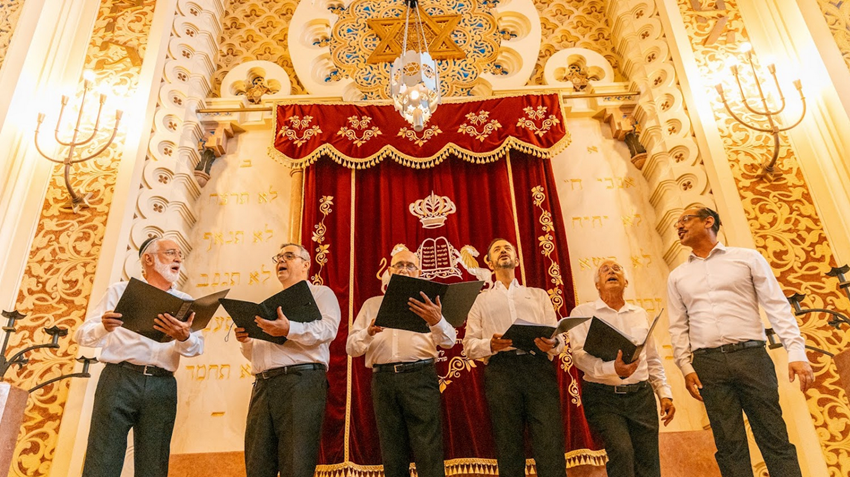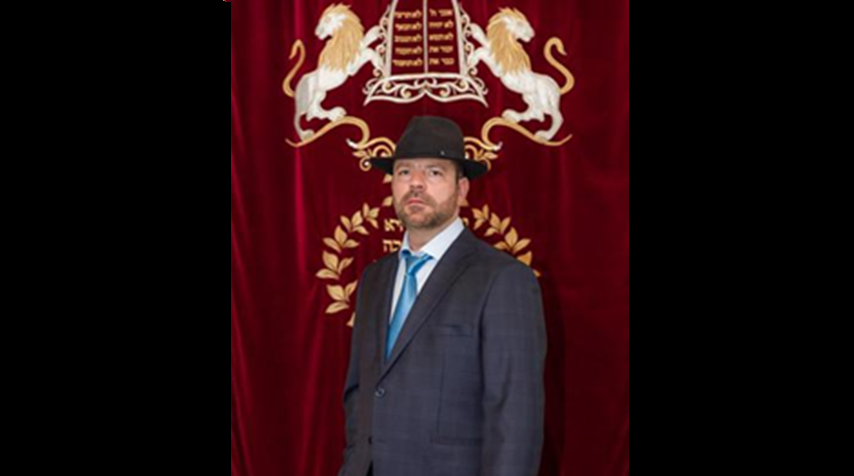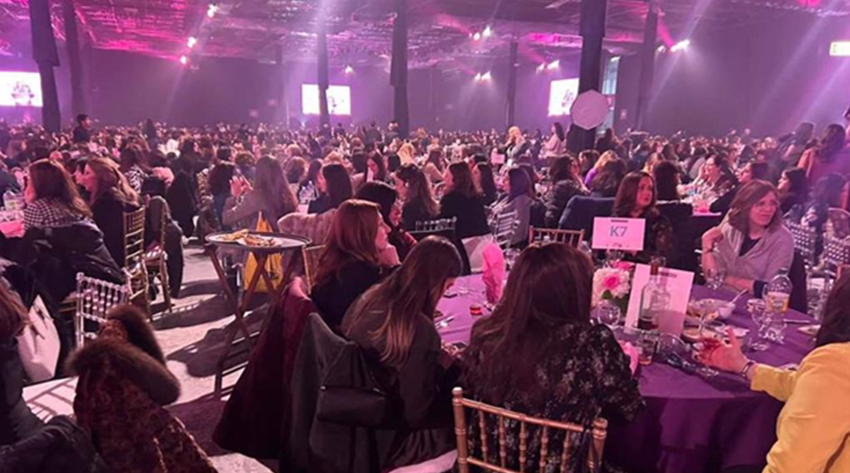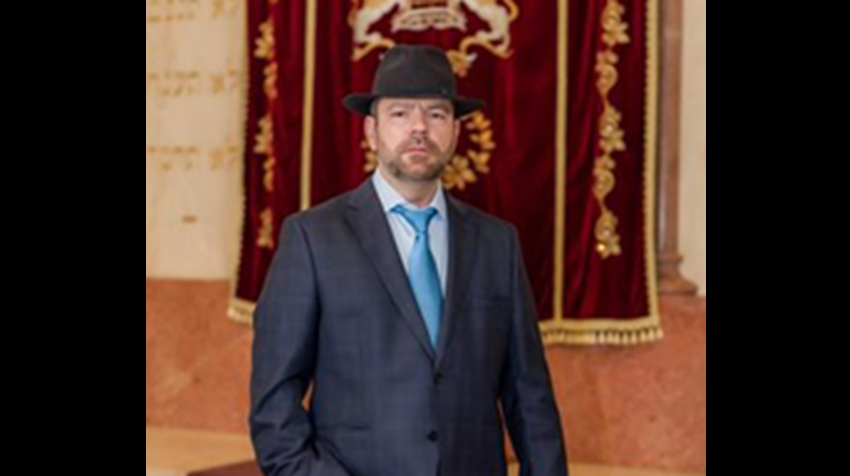The Mekor Haim Choir performing during the European Day of Jewish Culture. Credit: CIP/CJP
The Mekor Haim Choir is a prominent and consistent presence in the cultural life of Porto’s Jewish community. Founded five years ago by Yonah Yaphe and Luciano Moura and led by award-winning conductor and composer Leonardo Mendonça, the group performs monthly at the Porto Holocaust Museum as well as at various community events. Its repertoire spans songs in Ladino, Yiddish, and German, pieces that commemorate the Holocaust, and, above all, works from Jewish liturgy in Hebrew.
To mark the choir’s fifth anniversary, we spoke with Dr. Yonah Yaphe, who has lived in Canada, Israel, and currently resides in Portugal. Yonah’s dedication is one of the main pillars of this artistic initiative, which uses music to celebrate identity, memory, and spirituality.

The current formation of the Mekor Haim Choir. Credit: Mekor Haim Choir
Interview with Dr. Yonah Yaphe, co-founder of the Mekor Haim Choir
PJN: How did the idea of creating a choir dedicated to Jewish repertoire come about? What motivated and inspired this project from the very beginning?
YY: The choir is a labour of love. Music is a huge part of Jewish life in the home and in the Synagogue. This has been my experience living in Canada, in Israel, and in Portugal. The Jewish Community in Porto and the Kadoorie Mekor Haim Synagogue have many people with beautiful voices who know special melodies. On many occasions in synagogue on Shabbat, and at special events like our Hanukkah and Purim parties, I would sing together with my neighbours, like Dr. Luciano Moura. We would often make comments to each other like: “Let’s start a synagogue choir to bring these voices together.” One day in 2020, during the pandemic, Luciano said he had found a conductor, Leonardo Mendonça, from Minas Gerais in Brazil, who was willing to help us form a choir. Leonardo is a talented singer, conductor, composer, arranger, pianist and vocal coach. Leonardo and Luciano met at my house on October 27, 2020. We sang Lecha Dodi and Shalom Aleichem by the piano in our living room. We then obtained the solid support of the Synagogue Board for the choir’s activities. The rest, as they say, is history.

Co-founder Dr. Yonah Yaphe in a choir presentation at the Kadoorie Mekor Haim Synagogue. Credit: CIP/CJP
PJN: The Mekor Haim Choir was born in the midst of the pandemic. What was it like to form the choir in such a challenging context? And how did you and the members experience singing and rehearsing during that period?
YY: It certainly was a challenge. Many people in isolation were afraid to meet others. Singing is a notorious way to spread droplets in public. However, a few brave people using the right safeguards (masks and distancing), were able to overcome this. Then we discovered a brilliant, free, computer program called Jamulus that allowed us to rehearse together on-line from our homes. We use Zoom for the video part of our rehearsals, but it suffers from long sound delays. Jamulus synchronizes our voices so that we can sing together. We still rehearse every week online on Monday evenings at 7:30 pm, in addition to our weekly rehearsals on Friday at 2:30 pm in the Synagogue. This allows our members in Canada and in Israel to sing with us from a distance. So, even some good things came out of the pandemic.

A Kadoorie Mekor Haim Synagogue was filled to capacity to watch the choir’s performance. Credit: CIP/CJP
PJN: Audience feedback has been extremely positive. Looking back on this journey, which moments, performances, or achievements do you consider the most memorable?
YY: Our first public performance was at the official opening of the Holocaust Museum of Porto in April 2021. We sang Ani Ma’amin (I believe). The choir members were as moved as the audience by this privilege. Other highlights of our past five years include a concert for members of The Aristides de Sousa Mendes Foundation who visited the museum. They are descendants of survivors of the Holocaust who were saved by the efforts of the Portuguese Consul in Bordeaux during the Second World War. We also enjoyed singing with the members of the Shira Choir from Israel during their recent tour of Portugal. We enjoyed performing in the Synagogue for the public on the European Days of Jewish Culture.
PJN: What have been the main challenges the choir has faced over these five years?
YY: The biggest challenge has been growth. We have a dedicated core of about 8 regular members who perform together at the Holocaust Museum on the last Friday of every month. However, we would like to expand so that we can sing a wider repertoire and reach more people.

Dr. Luciano Moura co-founded the choir alongside Yaphe. Credit: CIP/CJP
PJN: The Jewish repertoire is extremely diverse. How do you curate the music, and what criteria guide your selections?
YY: I had the privilege of singing in the Shira Choir in Israel under the direction of Talma Tzurawel for 13 years. Much of our material comes from that experience. The internet is a rich source of musical scores. We have found music in Hebrew, Yiddish, and Ladino that way. Our choices are based on songs that have a special connection to the Jewish community of Portugal. For example, we found a songbook from London called ‘The Ancient Melodies of the Liturgy of the Spanish and Portuguese Jews’ arranged by Emannuel Aguillar. It uses old Portuguese melodies in the synagogue service. We have enjoyed learning and performing these songs.

The Mekor Haim Choir performing at Kadoorie Mekor Haim Synagogue. Credit: CIP/CJP
PJN: What has surprised you the most in the process of bringing together and leading people with such different backgrounds, united through Jewish music?
YY: Music brings people together. We have members from the Jewish Community and from the larger Portuguese community. There is tremendous interest in Jewish culture, history and religion here. Many of our members started learning Hebrew to increase their understanding of our repertoire. The response from the public, and especially from Portuguese teenagers who hear us at the Holocaust Museum, has been especially gratifying.
PJN: Is there a particular piece, arrangement, or special project that you still hope to accomplish with the Mekor Haim Choir but hasn’t happened yet?
YY: We hope to learn more of the Portuguese melodies of Emannuel Aguillar from London to do an entire concert of his synagogue music. We would also like to do a concert of the 17th Century Baroque synagogue music of Salomone Rossi from Mantua, Italy. A concert of popular Ladino songs with lively Iberian melodies and nostalgic Romances is another idea. I would like the choir to learn and perform Psalm 150 (Hallelujah) by Louis Lewandowski because it reminds me of High Holiday services I attended as a child growing up in Canada.

Maestro Leonardo Mendonça has accompanied the choir since its founding. Credit: CIP/CJP
PJN: What are the plans, goals, and dreams for the coming years of the Mekor Haim Choir?
YY: We want to expand to allow us to do more impressive musical projects. We hope to keep performing at the Museum and teaching the public about Jewish culture. We hope to tour one day to bring our special music from Porto to other countries. I want to take advantage of this opportunity to invite anyone who is interested to contact me at yonahyaphe@hotmail.com for information on how to join the choir.



































